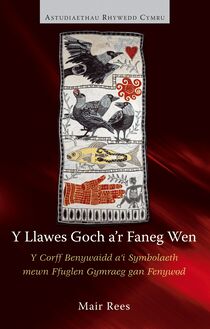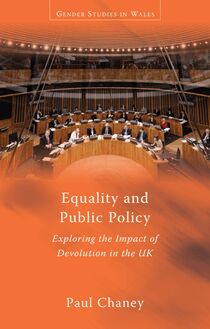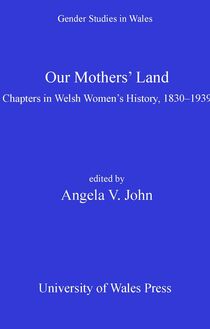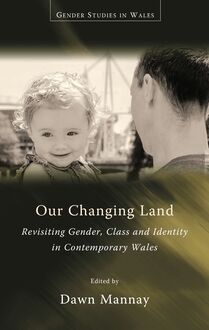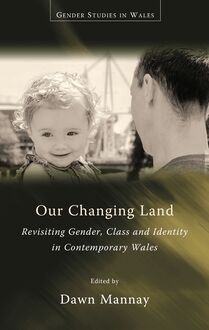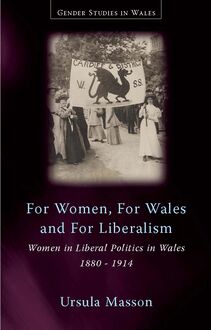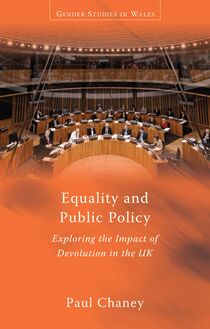Our Changing Land , livre ebook
123
pages
English
Ebooks
2016
Vous pourrez modifier la taille du texte de cet ouvrage
Obtenez un accès à la bibliothèque pour le consulter en ligne En savoir plus
Découvre YouScribe en t'inscrivant gratuitement
Découvre YouScribe en t'inscrivant gratuitement
123
pages
English
Ebooks
2016
Vous pourrez modifier la taille du texte de cet ouvrage
Obtenez un accès à la bibliothèque pour le consulter en ligne En savoir plus
Publié par
Date de parution
15 juin 2016
Nombre de lectures
0
EAN13
9781783168866
Langue
English
Poids de l'ouvrage
3 Mo
The last two decades have seen big changes within a small nation; the distinctiveness of Wales, in terms of its political life and culture, has grown considerably in that time. This edited collection by a range of eminent Welsh writers, emerging academics and creative artists examines what is distinctive about Wales and Welshness in an interdisciplinary yet comprehensive manner. The core concepts of gender, class and identity are explored throughout the book, which presents twelve chapters in three distinct yet overlapping thematic sections: Wales, Welshness, Language and Identity, Education; Labour Markets and Gender in Wales; and Welsh Public Life, Social Policy, Class and Inequality. The chapters explore the role of men and women in Wales and of Wales itself as a nation, an economy, and a centre of partially devolved governance, raising questions related to equality, policy and progression. The collection also features photographs, graphic art and poetic verse that both represent and extend the central arguments of the book.
1. Introduction
– Dawn Mannay
SECTION ONE - Wales, Welshness, Language and Identity
2. Devolved Voices: Welsh Women’s Writing post 1999
– Jane Aaron
3 Only inside the classroom? Young people’s use of the Welsh language in the school, community and peer group
- Non Geraint
4. Who should do the dishes now? Revisiting Gender and Housework in Contemporary Urban South Wales
- Dawn Mannay
SECTION TWO – Education, Labour Markets and Gender in Wales
5. ‘Placing young men’: The performance of young working-class masculinities in the S1outh Wales Valleys
- Michael R.M Ward
6. Re-Educating Rhian: Experiences of Working-class Mature Student Mothers
- Melanie Morgan
7. Private lives used for public work: Women Further Education teachers in Wales
- Jane Salisbury
8. From low-wage manufacturing industries to the low-wage service sector: the changing nature of women's employment in Wales
- Caroline Lloyd
9. Changes and continuities: Women in paid work in Wales 1994-2014
- Alison Parken
SECTION THREE – Welsh Public Life, Social Policy, Class and Inequality
10. Class, Poverty and Politics in Devolved Wales
- Dave Adamson
11. Women and Policy-Making: Devolution, Civil Society and Political Representation
- Paul Chaney
12. The transformation of the media in Wales: technology and democracy
- Hugh Mackay
13. Wind Energy: Revisiting the Debate in Wales
- Karen Parkhill and Richard Cowell
14. Conclusion
- Dawn Mannay
Publié par
Date de parution
15 juin 2016
Nombre de lectures
0
EAN13
9781783168866
Langue
English
Poids de l'ouvrage
3 Mo
Gender Studies in Wales Astudiaethau Rhywedd yng Nghymru
Series Editors Jane Aaron, University of South Wales Brec’hed Piette, Bangor University Sian Rhiannon Williams, Cardiff Metropolitan University
Series Advisory Board Deirdre Beddoe, Emeritus Professor Mihangel Morgan, Aberystwyth University Teresa Rees, Cardiff University
The aim of this series is to fill a current gap in knowledge. As a number of historians, sociologists and literary critics have for some time been pointing out, there is a dearth of published research on the characteristics and effects of gender difference in Wales, both as it affected lives in the past and as it continues to shape present-day experience. Socially constructed concepts of masculine and feminine difference influence every aspect of individuals’ lives; experiences in employment, in education, in culture and politics, as well as in personal relationships, are all shaped by them. Ethnic identities are also gendered; a country’s history affects its concepts of gender difference so that what is seen as appropriately ‘masculine’ or ‘feminine’ varies within different cultures. What is needed in the Welsh context is more detailed research on the ways in which gender difference has operated and continues to operate within Welsh societies. Accordingly, this interdisciplinary and bilingual series of volumes on Gender Studies in Wales, authored by academics who are leaders in their particular fields of study, is designed to explore the diverse aspects of male and female identities in Wales, past and present. The series is bilingual, in the sense that some of its intended volumes will be in Welsh and some in English.
Also in series Huw Osborne – Queer Wales: The History, Culture and Politics of Queer Life in Wales Alice Entwistle – Poetry, Geography, Gender: Women Rewriting Contemporary Wales Kirsti Bohata and Katie Gramich -Rediscovering Margiad Evans: Marginality, Gender and Illness
OUR CHANGING LAND
Revisting Gender, Class and Identity in Contemporary Wales
Edited by
Dawn Mannay
UNIVERSITY OF WALES PRESS CARDIFF 2016
© The Contributors, 2016
All rights reserved. No part of this book may be reproduced in any material form (including photocopying or storing it in any medium by electronic means and whether or not transiently or incidentally to some other use of this publication) without the written permission of the copyright owner except in accordance with the provisions of the Copyright, Designs and Patents Act. Applications for the copyright owner’s written permission to reproduce any part of this publication should be addressed to the University of Wales Press, 10 Columbus Walk, Brigantine Place, Cardiff, CF10 4UP.
www.uwp.co.uk
British Library Cataloguing-in-Publication Data A catalogue record for this book is available from the British Library.
ISBN 9781783168842 e-ISBN 9781783168866
The right of the Contributors to be identified as authors of their contributions has been asserted by them in accordance with sections 77, 78 and 79 of the Copyright, Designs and Patents Act 1988.
Cover image: Our Changing Land , by Ian Homer.
Contents
List of Illustrations, Figures and Tables
List of Contributors
Acknowledgements
1 Introduction
Dawn Mannay
I. Wales, Welshness, Language and Identity Hybrid Identity by KAOS – Song Lyrics
2 Devolved Voices: Welsh Women’s Writing Post 1999
Jane Aaron
3 Only Inside the Classroom? Young People’s Use of the Welsh Language in the School, Community and Peer Group
Non Geraint
4 Who Should Do the Dishes Now? Revisiting Gender and Housework in Contemporary Urban South Wales
Dawn Mannay
5 ‘Placing young men’: The Performance of Young Working-class Masculinities in the South Wales Valleys
Michael R. M. Ward
II. Education, Labour Markets and Gender in Wales Beautiful by Tasha Harvey – Song Lyrics
6 Re-educating Rhian: Experiences of Working-class Mature Student Mothers
Melanie Morgan
7 Private Lives Used for Public Work: Women Further Education Teachers in Wales
Jane Salisbury
8 From Low-wage Manufacturing Industries to the Low-wage Service Sector: The Changing Nature of Women’s Employment in Wales
Caroline Lloyd
9 Changes and Continuities: Women in Paid Work in Wales 1994–2014
Alison Parken
III. Welsh Public Life, Social Policy, Class and Inequality Politricks by Jamie Feeney aka Sapien – Song Lyrics
10 Class, Poverty and Politics in Devolved Wales
Dave Adamson
11 Women and Policy-making: Devolution, Civil Society and Political Representation
Paul Chaney
12 The Transformation of the Media in Wales: Technology and Democracy
Hugh Mackay
13 Wind Energy: Revisiting the Debate in Wales
Karen Parkhill and Richard Cowell
14 Conclusion
Dawn Mannay
Notes
References
List of Illustrations, Figures and Tables
List of Illustrations
Chapter 2 Millennium Centre Poem, Gwyneth Lewis – by Ian Homer
Chapter 3 School Students and Popular Literature – by Ian Homer
Chapter 4 Who Does the Dishes? – by Ian Homer
Chapter 5 A Post-industrial Welsh Landscape – by Ian Homer
Chapter 6 Balancing Academic Study and Motherhood – by Ian Homer
Chapter 7 Credentials and the Chameleon – by Ian Homer
Chapter 8 The Clothing Industry – by Ian Homer
Chapter 9 Paula at Eastmoors – by Ian Homer
Chapter 10 Clocking Out, Hoover, Merthyr Tydfil – by Ian Homer
Chapter 11 Don’t Attack Iraq – by Ian Homer
Chapter 12 Dr Who – by Nathan Bond
Chapter 13 No Way to Powys Pylons – by Ian Homer
List of Figures
4.1 ‘It’s not too bad with these irons they got now’
4.2 Time
8.1 Manufacturing workforce jobs in Wales
13.1 Annual levels of wind farm development in Wales
13.2 Strategic search areas for large-scale onshore wind development
List of Tables
7.1 Vignettes of the six women FE teachers and their ‘credentials’
8.1 Employment rate in the UK and Wales
8.2 Highest level of qualification held by working-age adults, UK and Wales
9.1 Employment rate UK and Wales, aged 16–64, and by gender within Wales 2004–14
9.2 Changes in employment profile for Wales by sector, 1990–2020
12.1 Change in circulation, Trinity Mirror newspapers in Wales, 2013–14
12.2 Print losses and online gains, selected newspapers in Wales, 2012–13
12.3 Welsh broadcasters’ website users (weekly unique users, thousands), 2013–14
13.1 Summary of the reasons for support and opposition outlined in McKenzie Hedger (1994)
13.2 Participant responses to the question ‘How favourable or unfavourable are your overall opinions or impressions of the following energy sources for producing electricity currently?’
List of Contributors
JANE AARON is Emeritus Professor of English at the University of South Wales. Her publications include the monographs Pur fel y Dur: Y Gymraes yn Llên Menywod y Bedwaredd Ganrif ar Bymtheg (Cardiff: University of Wales Press, 1998), which won the Ellis Griffith prize in 1999, Nineteenth-century Women’s Writing in Wales (Cardiff: University of Wales Press, 2007), which won the Roland Mathias Award in 2009, and Welsh Gothic (Cardiff: University of Wales Press, 2013). She co-edited the essay collections Our Sisters’ Land: The Changing Identities of Women in Wales (Cardiff: University of Wales Press, 1994), Postcolonial Wales (Cardiff: University of Wales Press, 2005) and Gendering Border Studies (Cardiff: University of Wales Press, 2010), and is also co-editor of the series Gender Studies in Wales and Writers of Wales, both published by the University of Wales Press, and editor of Honno Press’s reprint series of Welsh Women’s Classics, for which she has edited five volumes.
DAVE ADAMSON is Emeritus Professor of the University of South Wales and was CEO of the Centre for Regeneration Excellence Wales (CREW). Professor Adamson was awarded the OBE for his contribution to regeneration in Wales and his research has shaped policy in Wales at local and national level in this field. Dave’s doctoral thesis and subsequent book centred on the historical emergence of Welsh nationalism and his post-doctoral work analysed social class and political change in Wales. More recently, Dave’s work has focused on poverty and social exclusion and the identification of innovative strategies for eradicating poverty. His most recent publication is Adamson and Lang Toward a New Settlement: A Deep Place Approach to Equitable and Sustainable Places (Merthyr Tydfil: CREW, 2014). He is currently working in Australia on poverty and social housing issues.
NATHAN BOND is a Welsh artist based in the Victoria Park area of Cardiff. Nathan studied art and design at Glan Hafren College and then undertook studies in computer animation at Glamorgan University. Nathan’s approach is particularly influenced by the early work of Hanna-Barbera and Walt Disney and he works in the fields of illustration, character design and graphic art. Nathan created the Dr Who image to represent Hugh Mackay’s chapter, ‘The Transformation of the Media in Wales: Technology and Democracy’.
PAUL CHANEY is Professor of Policy and Politics at Cardiff University’s School of Social Sciences. His books include Women, Politics and Constitutional Change (Cardiff: University of Wales Press, 2007; co-authored with Fiona Mackay and Laura McAllister), Equality and Public Policy (Cardiff: University of Wales Press, 2011) and Public Policy-making and the Devolved State (Cardiff: University of Wales Press, forthcoming). He was co-editor of Contemporary Wales: An Annual Review of Economic, Political and Social Research . He has published widely in leading academic journals. His research interests include: equality and human rights; territorial politics; public policy-making and devolution.
RICHARD COWELL completed undergraduate and postgraduate studies at the Department of Geography, Cambridge University. Since arriving at Cardiff University’s School of Planning and Geography, Richard has held appointments as a research fellow, and is presently a Reader (fr

